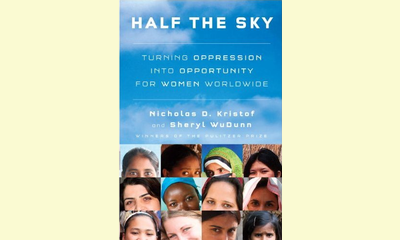|
|
'Women Hold Up Half the Sky'
an article by Sarah Ann Smith
The National Bestseller Half the Sky: Turning Oppression into Opportunity for Women Worldwide is written by Nicholas D. Kristof and Sheryl WuDunn. This book is about women worldwide and approaches many different subjects that need to be addressed. Within this book are real stories and interviews that WuDunn and Kristof conducted. They talk about a variety of subjects such as micro-financing, human trafficking, honor burnings, genital cutting, and so on. While there is ample opportunity to talk about any part of the book, what is imperative is that these women could use help. First of all I encourage all readers to pick up a copy of the book-it just might change your life. But most importantly I would like to pass on the last words of the book. Things anyone can do in ten minutes that could mean the world to someone who needs help. 
click on photo to enlarge
At the end of the novel there is a section “Four Steps You Can Take in the Next Ten Minutes” and they are as following:
1.Go to globalgiving.org and www.kiva.org and open an account. Both sites are people-to-people (P2P), meaning they link you directly to a person in need overseas, and this makes them an excellent way to dip your toe in. Also try a third site, www.Giveology.com to help children pay for primary school in developing countries.
2. Sponsor a girl or woman through Plan International, Women for Women International, World Vision, or American Jewish World Service.
3. Sign up for e-mail updates on www.womensenews.org and a similar service, www.worldpulse.com. Both distribute information about abuses of women and sometimes advise on actions that readers can take.
4. Join the CARE Action Network at www.can.care.org. This will assist you in speaking out, educating policy makers, and underscoring that the public wants action against poverty and injustice. This kind of citizen advocacy that is essential to create change.
5. And the last step is one I add: http://www.halftheskymovement.org/get-involved. This is the website’s alphabetized list of programs with a description of each. Go check it out, you are one click away!
|








|
DISCUSSION
Question(s) related to this article:
What other resources can be utilized to give women more opportunities?,
* * * * *
LATEST READER COMMENT:
On their website, the United Nations Population Fund makes it clear that lack of access to family planning is a form of violence against women.
"Gender-based violence both reflects and reinforces inequities between men and women and compromises the health, dignity, security and autonomy of its victims. It encompasses a wide range of human rights violations, including sexual abuse of children, rape, domestic violence, sexual assault and harassment, trafficking of women and girls and several harmful traditional practices. Any one of these abuses can leave deep psychological scars, damage the health of women and girls in general, including their reproductive and sexual health, and in some instances, results in death.
Violence against women has been called "the most pervasive yet least recognized human rights abuse in the world." Accordingly, the Vienna Human Rights Conference and the Fourth World Conference on Women gave priority to this issue, which jeopardizes women's lives, bodies, psychological integrity and freedom. Violence may have profound effects – direct and indirect – on a woman's reproductive health, including:
Unwanted pregnancies and restricted access to family planning information and contraceptives
Unsafe abortion or injuries sustained during a legal abortion after an unwanted pregnancy
Complications from frequent, high-risk pregnancies and lack of follow-up care
Sexually transmitted infections, including HIV
Persistent gynaecological problems
Psychological problems
Gender-based violence also serves – by intention or effect – to perpetuate male power and control. It is sustained by a culture of silence and denial of the seriousness of the health consequences of abuse. In addition to the harm they exact on the individual level, these consequences also exact a social toll and place a heavy and unnecessary burden on health services.
UNFPA recognizes that violence against women is inextricably linked to gender-based inequalities. When women and girls are expected to be generally subservient, their behaviour in relation to their health, including reproductive health, is negatively affected at all stages of the life cycle.
UNFPA puts every effort into breaking the silence and ensuring that the voices of women are heard. At the same time, the Fund works to change the paradigm of masculinity that allows for the resolution of conflict through violence. . ...more.

|
|









